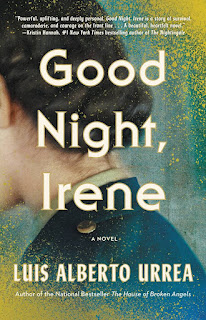The novel begins when Irene leaves New York and an abusive fiancé for training in Washington, D. C.
“November 1943
Dear Mother,
I have so much to tell you, but so much I can't say. I am sorry that I won't be home for the holidays and it might be a while before I see you again. As soon as I am free to explain, I believe you will be proud of me. I have joined the Red Cross and am going to do my part.
I had to make a change. I will explain more when I can.
Love, Irene
After stateside training, the volunteers arrive in England and Urrea captures their lives and intertwines their character development with descriptions of the countryside and the sad beauty of a Luftwaffe attack as the women’s train rolls into London’s Euston Station. “Flickering orange flames in the distance launched dense smoke columns into the sky. The glow of fires showed through the ruins of buildings. Churches that had already been reduced to shells by the Blitz were now transformed into enormous candles.”
Irene and Dorothy begin to see the value of their role in the war as they watch men await their fellow pilots return from battle and they share in their anguish when someone is feared lost. Irene pens another letter home despite her mother not having written back.
“London, December 21, 1943
Dear Mother,
If you were wondering what I'm doing here. . .
He hit me.
Merry Christmas, Mother.
Good night, Irene”
Soon the women and their Clubmobile, a mobile unit with two large coffee urns, a record player, and a donut-making machine, cross the English Channel and serve alongside General Patton’s 3rd Army from the beaches of Normandy through France and Germany facing bombings, attacks, and eventually the horrors of Buchenwald. Dorothy, a tall, no-nonsense woman, and Irene, an artsy city girl, become close as they share living among soldiers, working beyond what seems physically possible, and suffering PTSD from all they've endured. Urrea imbues Irene, Dorothy, and many of the soldiers and others they meet with realistically endearing senses of humor that make the most difficult of their experiences bearable. He also uses engaging word pictures to portray the land they traverse so that the reader can see that these aren't just battle locales, they're actual places where people live and love.
The story of these women is important to Urrea. His mother was a Clubmobile volunteer who had nightmares every night he can remember. Urrea and his wife Cindy, a former reporter who helped research the novel, found Urrea’s mother’s Clubmobile partner living only two hours from them and the woman shared remarkable insights and letters that helped Urrea tell the story with facts, compassion, and infinite care.
Love abounds in this novel—love infused with the sadness of war alongside the joy found in the bonds of friendships made while serving together. Luis Alberto Urrea has given the world award-winning novels, poetry, and nonfiction, but Good Night, Irene may be his best with its poetic rendering of a forgotten piece of history and a powerful ending that fits perfectly.
Summing it Up: Good Night, Irene is a novel that reveals the truth about World War II in Europe and depicts it more vividly than nonfiction ever could. In Good Night, Irene, we feel what Irene and Dorothy felt, we laugh with them, we watch them grow stronger, and we ache when they suffer and are near the breaking point from living through such trauma. Good Night, Irene is the best book I’ve read this year and I’ve read more than fifty and several of them have been outstanding. If you loved Kristin Hannah’s The Nightingale and Suite Française by Irène Némirovsky, you will find yourself equally immersed in Good Night, Irene.
Footnote: Read this article for a beautiful picture of Urrea and for more in-depth information about his mother: https://www.pw.org/content/bringing_the_joy_a_profile_of_luis_alberto_urrea
Rating: 5 Stars
Publication Date: May 30, 2023
Category: Fiction, Five Stars, Grandma’s Pot Roast, Pigeon Pie, Super Nutrition, Book Club
Author Website: http://luisurrea.com/
Interview with the Author: https://www.publishersweekly.com/pw/by-topic/authors/interviews/article/91663-a-ballad-for-unsung-heroes-pw-talks-with-luis-alberto-urrea.html
What Others are Saying:
BookPage: https://www.bookpage.com/reviews/good-night-irene-luis-alberto-urrea-book-review/
Kirkus Reviews: https://www.kirkusreviews.com/book-reviews/luis-alberto-urrea/good-night-irene/
NPR: https://www.npr.org/2023/05/22/1177057433/luis-alberto-urrea-good-night-irene-review
Publishers Weekly: http://www.publishersweekly.com/9780316265850
“Urrea’s touch is sure, his exuberance carries you through . . . He is a generous writer, not just in his approach to his craft but in the broader sense of what he feels necessary to capture about life itself.” —Financial Times
“Good Night, Irene is a beautiful, heartfelt novel that celebrates the intense power and durability of female friendship while shining a light on one of the fascinating lost women’s stories of World War II. Inspired by his own family history—and his mother’s heroism as a Red Cross volunteer during the war—Luis Urrea has created an indelible portrait of women’s courage under extreme adversity. Powerful, uplifting, and deeply personal, Good night, Irene is a story of survival, camaraderie, and courage on the front line.”
—Kristin Hannah, #1 New York Times bestselling author of The Nightingale and The Four Winds
“Every once in a while the universe opens its heart and pulls out a book like this novel, gifting it to the cosmos. In Good Night, Irene, a new element has been created, and the literary world is reborn in the image of Luis Alberto Urrea. His voice comes alive on every page of this magnificent novel.”
—Jamie Ford, New York Times bestselling author of The Many Daughters of Afong Moy and Hotel on the Corner of Bitter and Sweet

No comments:
Post a Comment